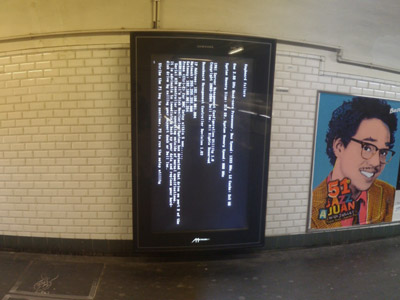Code Culture, between freedom, power, and illiteracy
This is part of a short series of articles on Coding Goûter. Read them on ils.sont.la
You are awakened by your phone, you start the washing machine. Oh look, a new fully automated train in the metro. At lunch you pay with your credit card. In the evening you enjoy the lights on the Eiffel Tower. It’s an endless list. There is not an hour of our life (one minute?) without a programmer participating in it by writing… code.
Technologies that surround us are animated by code. They are transforming society and our lives, in nearly every aspect. The examples of this transformation, you’ll be able to find them by yourself. You already know them.
The danger of de facto illiteracy
If I am illiterate in our society, if I can not read, I find myself powerless and excluded. I am thus very easy to manipulate, as I am drowned in the omnipresence of text. Similarly, as we are now fully and completely in a computerized society, one who does not master the culture of code will be more and more powerless, excluded, and manipulated when facing new technologies.

Is there a code illiteracy? The concept is appealing because code is just text. A text that is used to create a program, an app, a website. A kind of special text, since it acts on the world directly, sometimes with hostility, as when it controls the gates of the subway! [in french but worth it]
Illiteracy or not, today a small number of people can read and write computer code. Just as a minority could read in the early 19th century, and an even smaller minority were mastering the dominant culture based on text, contracts, legal texts… well, once again, codes.
From invisible control to liberating creativity
For those who still doubt, remember that the founders of Facebook, YouTube, Twitter, Google, are all coders. These web platforms have transformed society in just a few years. They scare people.
The web (and venture capital) has transformed the skills of these programmers-entrepreneurs into a *new talent*, almost magical:
The talent of writing, from their rooms, new social rules, rules that spread and are adopted by all in a few months.
This talent should not remain in the hands of an elite set of new scribes, it must spread. We all need, sometimes, to count; we all need, sometimes, to read and write; and now we all need, sometimes, to code - without always realizing it.

Read and write, once again
If we want our children to be creative, independent, if we hope that as adults they use technology for their own freedom, we must pass on that code culture.
Pass it on to all kids? Yes, they must *all* learn programming. If they do not, their only choice will be to use tools and be subjected by rules they can not decrypt, nor modify. Tools and rules programmed by invisible masters.
